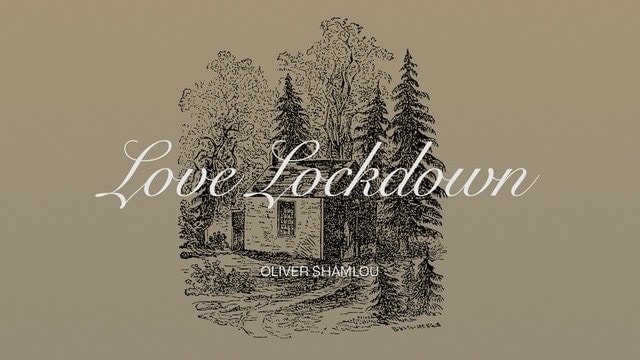

The spiritual instruction manual for the Locked Down
I’m lucky. I live in a biggish house with three basically decent men. Or, two men and a third man, Chuck, who spends his days dressed in either a zebra onesie or an onomatopoeic onesie—a jumpsuit, that is, made of fabric patterned with cartoon ‘bangs’ and ‘pops’ and ‘whams’. Imagine Lichtenstein went into loungewear. I don’t believe his wearing of this second is a comment on our particular catastrophic moment; it’s more like the zebra, clearly his favourite, needs a wash once in a while.
Chuck spends his days dressed in an onomatopoeic onesie—a jumpsuit with cartoon ‘bangs’ and ‘pops’ and ‘whams’.
The other two don’t come without their features—or indeed their bugs. The de facto house leader, Henry, is like a nobleman born into the wrong century. He’s wonderful when holding court, regaling us with stories of his misadventures, but won’t lower himself to chores. And Graham’s an excellent cook, often baking house treats, but he’s a sociable person and these newly confined and distanced times have him highly irritable; the tinniest thing can set him off. Then there’s me: I’m probably too tidy or something. We generally all get along, though, and since Lockdown have bonded more firmly over a house Bondathon down in Plato’s Cave, our subterranean living room where entertaining shadows are projected onto a big blank wall.
‘Those were the days’, Chuck might comment, when some prelapsarian scene involving >2 people all having a Really Fun Time standing far closer than social-distancing allows comes on, and then, as said scene goes south and descends into a brutal free-for-all: ‘Maybe not.’
We generally all get along, though, and since Lockdown have bonded more firmly over a house Bondathon…
Still, my mood under isolation veers daily. Some mornings I wake up appreciating the good fortune of my circumstances; others I can’t shake the feeling that this is not what I paid for. On those bad days, a lot of energy goes into shouldering the guilt I bear at my frustration of not being able to get a proper haircut or go for coffee with friends just because there’s an apocalypse afoot. My lifestyle choices, in other words, and priorities. Now feels like an unprecedentedly appropriate time to examine those and make some changes—to perhaps walk out of Lockdown and return to community, when community is again allowed, a better, less solipsistic person.
Mark Greif’s essay collection, Against Everything, makes this case powerfully. Greif’s that rare thing, an actual living philosopher, versed in the Ancients, and Against Everything‘s a serious try at a diagnosis of our culture. His central, rather uncomfortable, observation is: now that progress has allowed our needs to be met, we, in Western wealthy countries at least, have in the main devoted ourselves to what he calls ‘grooming’ or ‘optimisation’, complicating our state of sufficiency in pursuit of more specific, rarefied experiences, rather than pursuing higher ambitions of justice, democracy, and equality. Whether writing about exercise, food, travel, or the proper provenance of the word ‘hipster’, Greif wonders at our sometimes-complacent attitude of contentedness and whether what we’re doing is worth doing—and if not, how we might start living otherwise.

‘I mistrust any authority that is happy with this world as it is’, he writes, on the concept of experience. ‘I understand delight, and being moved by the things of this world. I understand feeling strong in oneself because of one’s capabilities.[…] I sympathize with gratitude for the presence of other people, and for plenty and splendor. But I cannot understand the failure to be disappointed with our experiences of the collective world, in their difference from our imaginations and desires, which are so strong. I cannot understand the failure to wish that this world was fundamentally more than it is.’
Greif’s that rare thing, an actual living philosopher, versed in the Ancients…
But Greif’s may not be the consolatory words that help right now. And you won’t find them in the news, which I imagine like me you’ve been reading a lot more than ever of. Instead, I suggest poetry—something that works against the objectivity and cold perspective of reporting prose. We know every number is a life, but the news won’t let you feel it. Reading and understanding poetry insists on intimacy, on loving and grieving. Every year, at about this time, I reread William Carlos Williams’s Spring and All. It’s a kind of manifesto of the imagination that alternates between prose and poetry. Its subjects range from life in modern cities to disquisitions on Shakespeare to plagiarism and, of course, the spring of the title. How Williams renders spring’s arrival in the work is curious. Though the main, titular spectacle, spring is often relegated, humorously, to a mention at the end of a paragraph, the bottom of a page, an afterthought, as if to say, ‘Oh, and by the way, don’t forget, spring is coming!’ That implication, that the greatest, most significant events are often given only incidental attention, speaks newly to me and my own frustrated ‘needs’.

And if the world is ending? It seems to be doing so, in London at least, with neither a bang, nor a ‘pop’ nor a ‘wham’, but the least-cruel April on record, the weather a small mercy amid so much crisis and uncertainty. The kids on my street have drawn hundreds of love hearts in coloured chalk all along the pavement. Out back, the cherry-blossom tree in our garden’s covered the patio in pink petals, as if I’ve just missed a wedding. There are finches at the feeder. If the world is ending, it is doing so at the same time as it is beginning, renewing itself. Spring is here.




